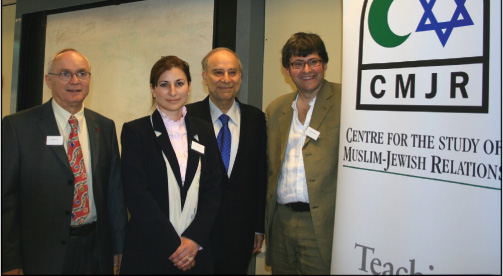Muslim-Jewish Relations:
The Way Forward
By Yonathan Gez
Interfaith student
 Founders
and supporters of the CMJR with Professor Akbar Ahmed
(third from left)
Founders
and supporters of the CMJR with Professor Akbar Ahmed
(third from left) |
Cambridge,
UK: The ongoing social changes in English society are being
reflected by some interesting developments in the academic
arena. Since 1998, Cambridge University has been the home
of the Centre for the Study of Jewish-Christian Relations
(CJCR), a unique institution combining rigorous academic
thinking with grassroots interfaith work. The last year
saw the formation of a complementary organization, the Centre
for the Study of Muslim-Jewish Relations (CMJR), co-directed
by Dr. Edward Kessler, who is also the Director of the CJCR,
and Dr. Amineh Hoti, the author of Sorrow and Joy Among
Muslim Women: the Pukhtuns of Northern Pakistan.
Both centers are hosted under the umbrella of the Woolf
Institute of Abrahamic Faiths, named after former Lord Chief
Justice of England and Wales, Lord Woolf.
The new center has recently hosted its first major public
event entitled "Muslim-Jewish Dialogue: the Way Forward".
The attendants were honored by the participation of Professor
Akbar Ahmed, a world-renowned authority on Islam and the
former High Commissioner for the Islamic Republic of Pakistan
in the UK. His introduction by Dr. Richard Stone, the founder
of the Alif-Aleph organization for British Muslims and Jews,
made it clear that, like his daughter co-Director Dr. Hoti,
Professor Ahmed is one of the clearest voices of interfaith
dialogue.
In his talk, Professor Ahmed pointed at the similar causes
of Islamophobia and Anti-Semitism, stating that "where
you see an act of Islamophobia, within three days there
will also be an anti-Semitic act". Professor Ahmed
also pointed at the multiplicity of viewpoints within Islam,
mentioning the voices of the universalists, modernists and
traditionalists.
Another highlight of the event was Dr. Kessler's exciting
announcement of a recently received donation of one million
pounds from the Stone Ashdown Trust.
WORKSHOPS: After a noon recess for lunch, in which ideas
were informally exchanged, four workshops were held. Dr.
Edward Kessler presented, in brief, the Islamic and Jewish
accounts of the near sacrifice of Abraham's son. He began
by putting the Qur’anic and Biblical accounts in parallel
with one another, then moved forward and pointed to exegetical
accounts within these two traditions. These later interpretations
deal with such debated elements in the story, as whether
it was Isaac or Ishmael who went with Abraham and the obedience
of the son. This demonstrated that, while interpreters of
the two faiths often reached different conclusions, they
asked similar questions of the shared story.
Dr Amineh Hoti presented a discussion on “Women in
Islam”. Drawing upon both her PhD research and the
content of her highly commended book, Dr Hoti discussed
the role of Muslim women through a case study in Pakistan.
To illustrate the difference between widely held perceptions
from some media simplification and the complexity of Muslim
women’s life in Pakistan, Dr. Hoti initially gathered
the participants’ negative and positive associations
in relation to Muslim women as represented in the media,
and concluded with a similar exercise finding striking differences.
It was a well-attended workshop with engaged and enthusiastic
participants.
Sheikh Michael Mumisa led a discussion on the inclusive
and exclusive nature of Islamic rhetoric about the ‘other’.
He gave the participants a taste of the deep complexity
of the meaning of such terms as Islam, Muslimun, Din,
and Kufr, unpacking the terms within both their Qur’anic
context and their later meanings given by the Ummah.
One of the questions brought up by the Sheikh was whether
a Jew or a Christian could be considered a "muslimun,"
(one who submits and surrenders to God).
Dr. Richard Stone and Urmee Khan led a discussion concerning
the recent ‘Mapping Positive Contacts’ project,
which examined community relations in the UK. One of the
conclusions reached concerned the need for improved teaching
in relation to religious education and interfaith interaction.
The connection between politics and interfaith was also
discussed. Urmee Khan suggested that although it is often
necessary to begin with subjects more neutral than politics
in order to open interfaith dialogue, it was equally important
not to ignore the controversial issues that such dialogues
inevitably raise.
WAY FORWARD: The conference marks what will hopefully be
a sustained and fruitful discourse. Dr. Hoti stated, "Because
together the three Abrahamic communities make up more than
half of the world's population, a genuine dialogue between
the three communities is key to world peace."
-------------------------------------------------------------------------------------

